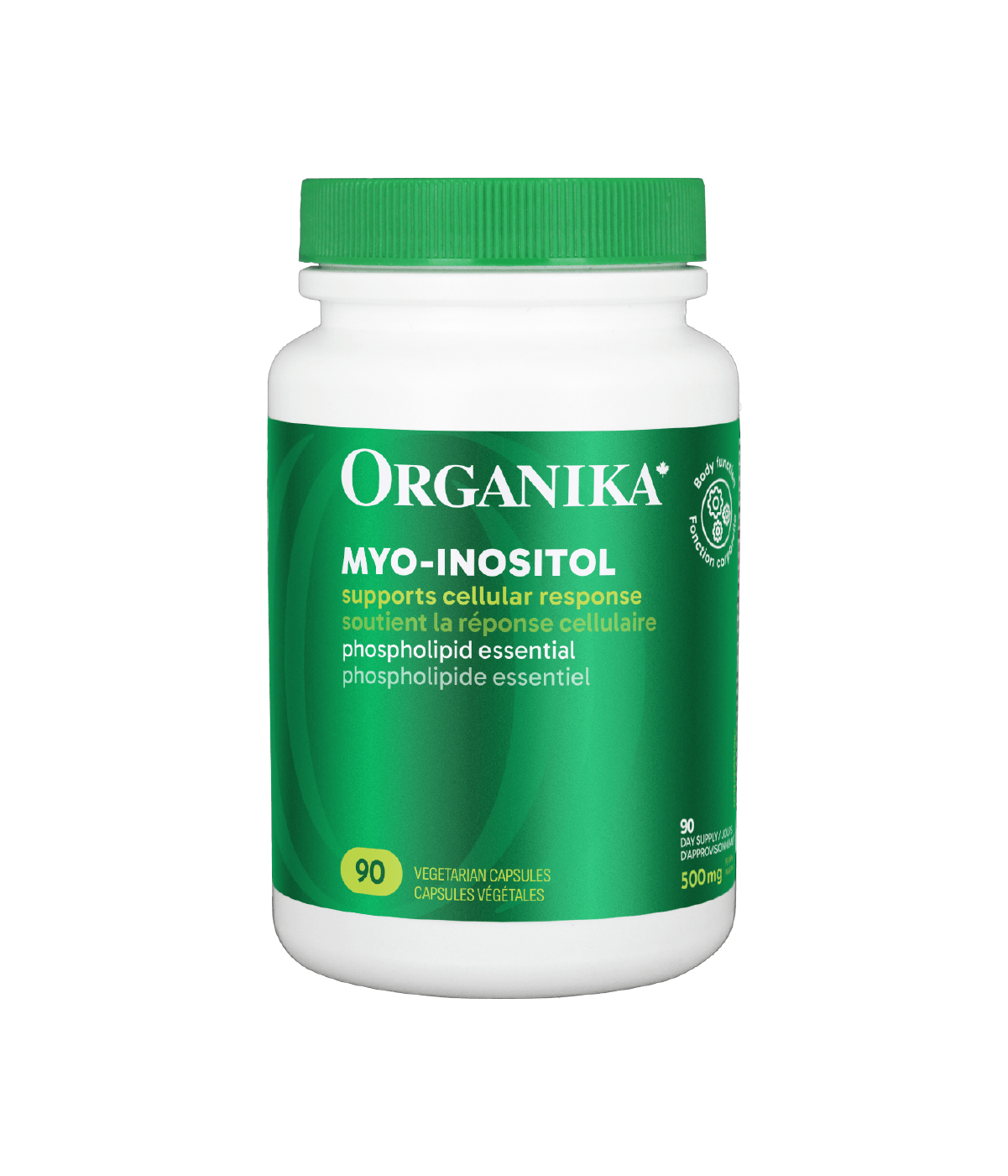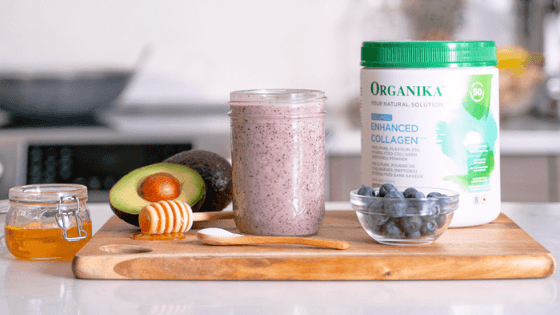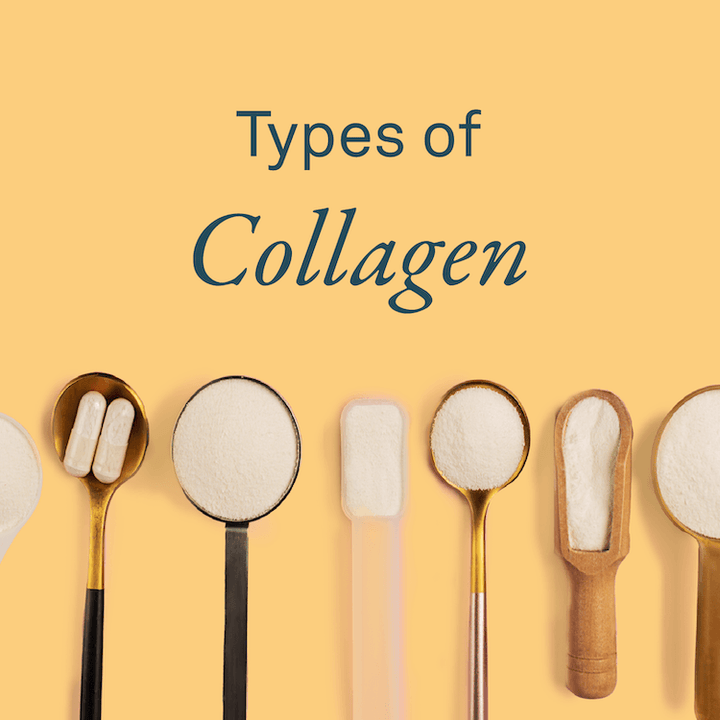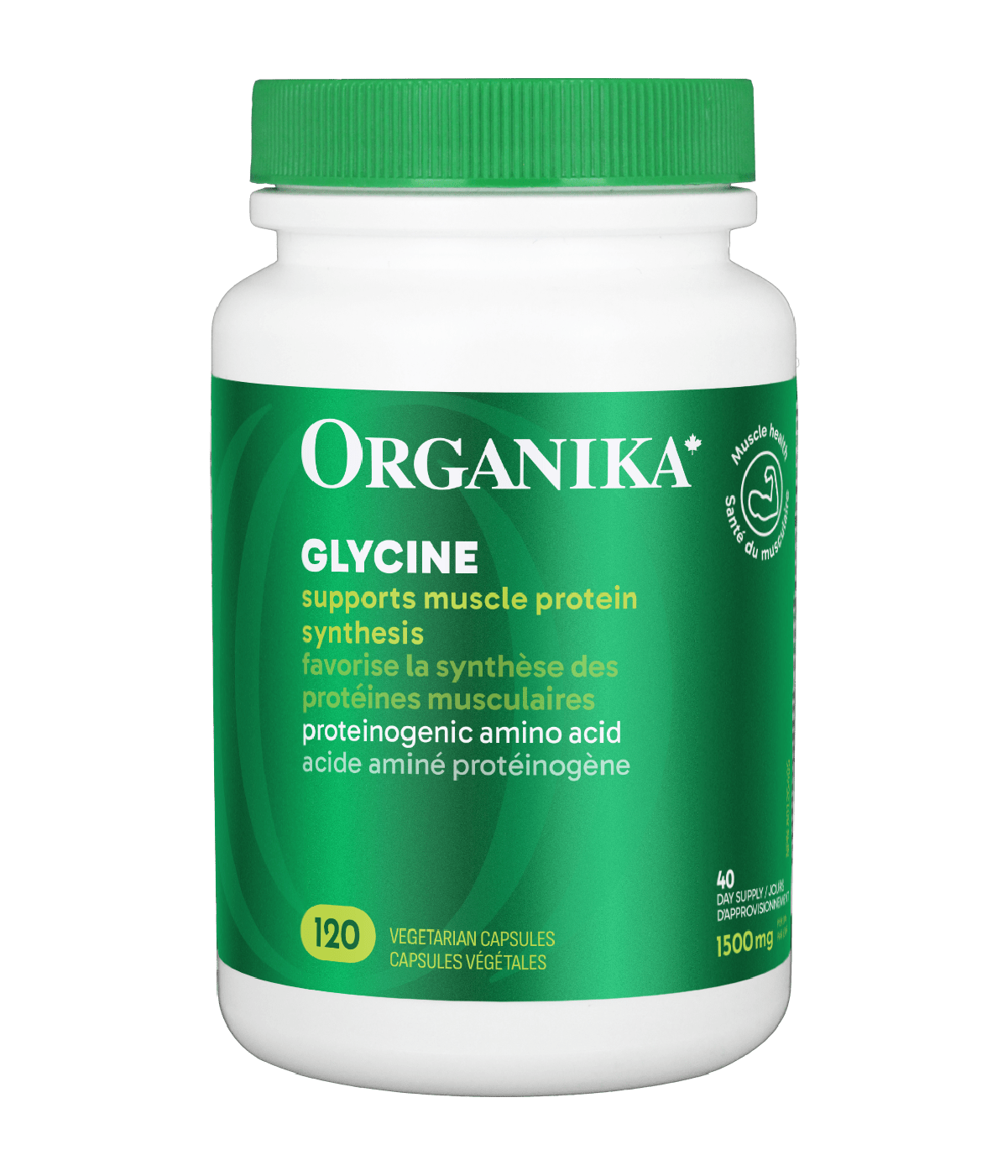
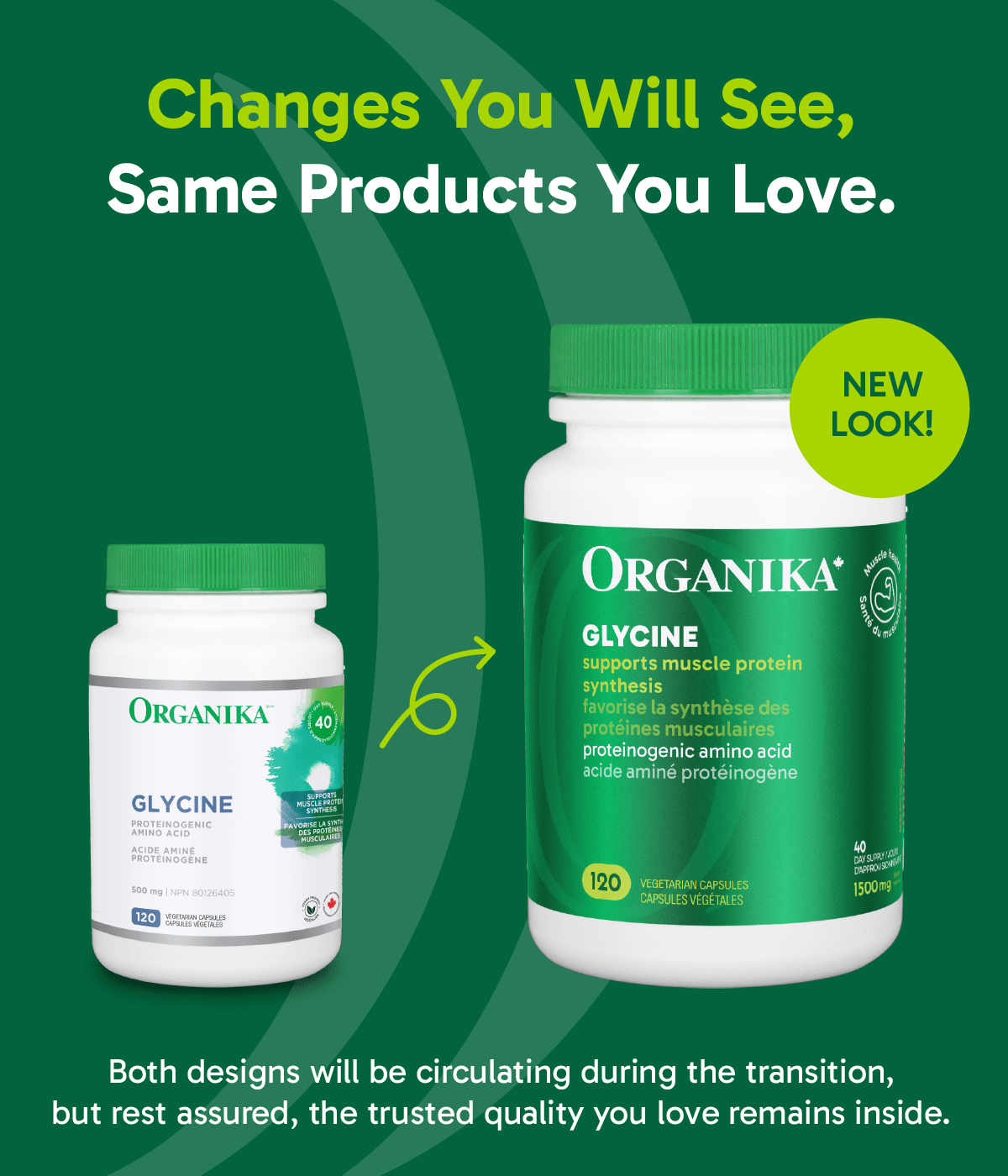
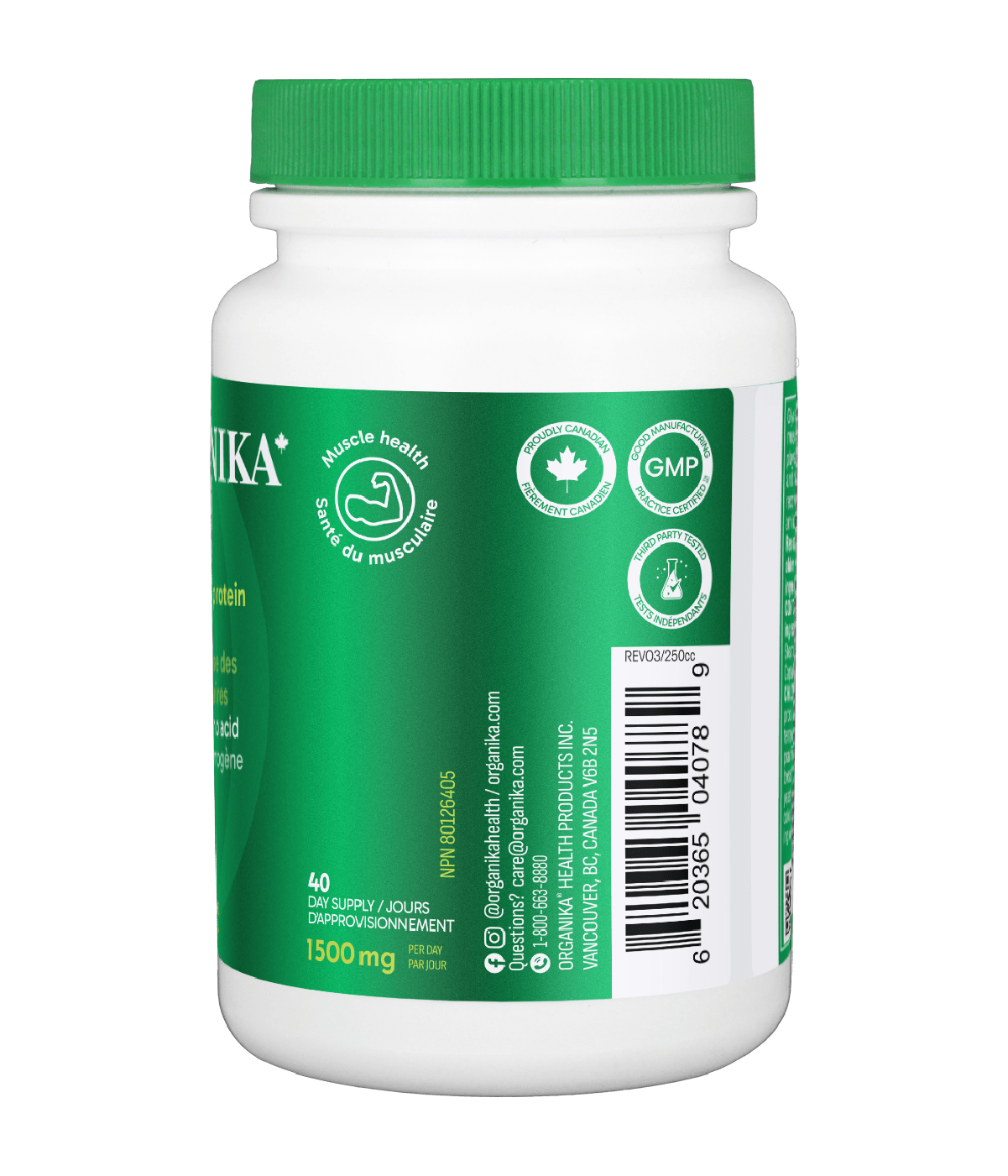
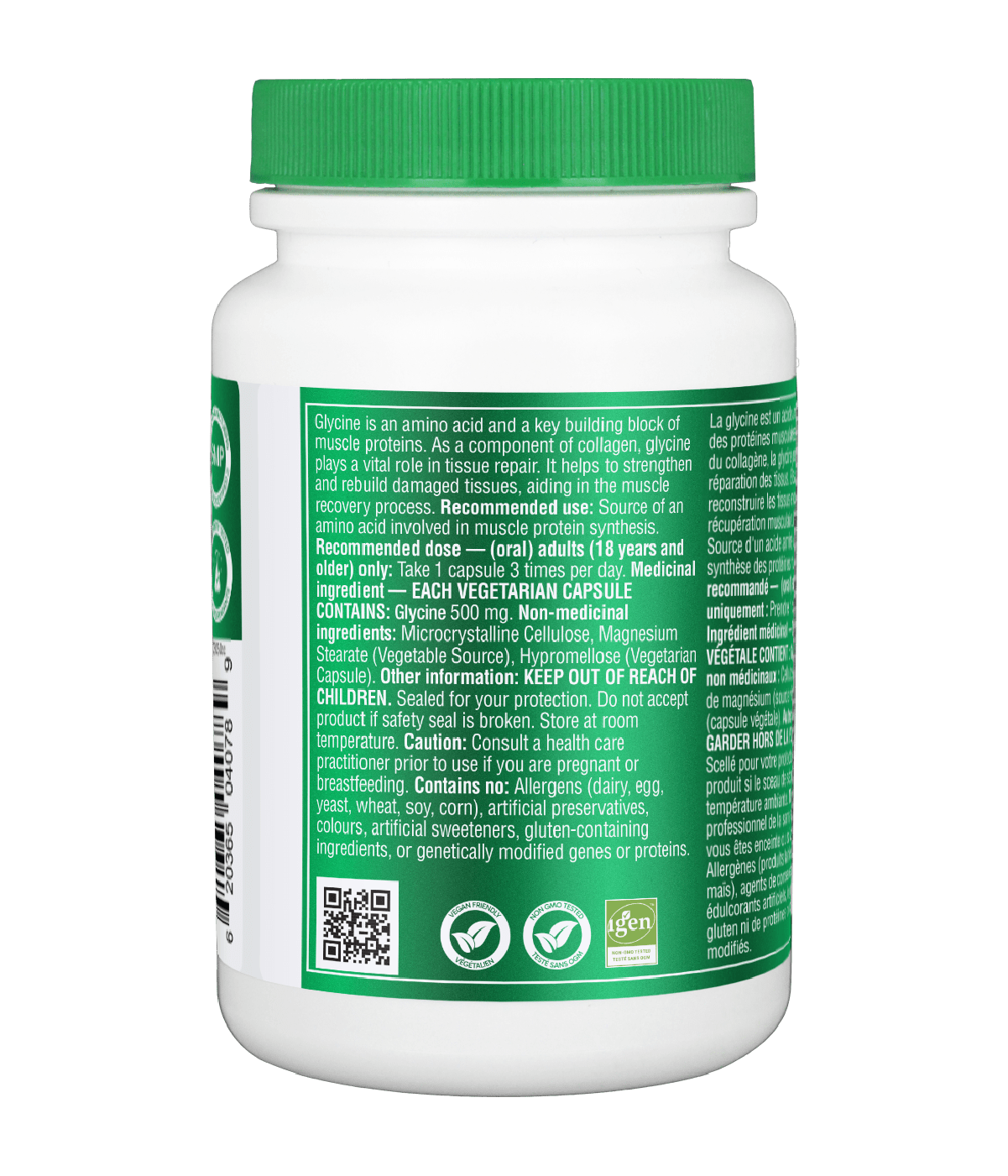
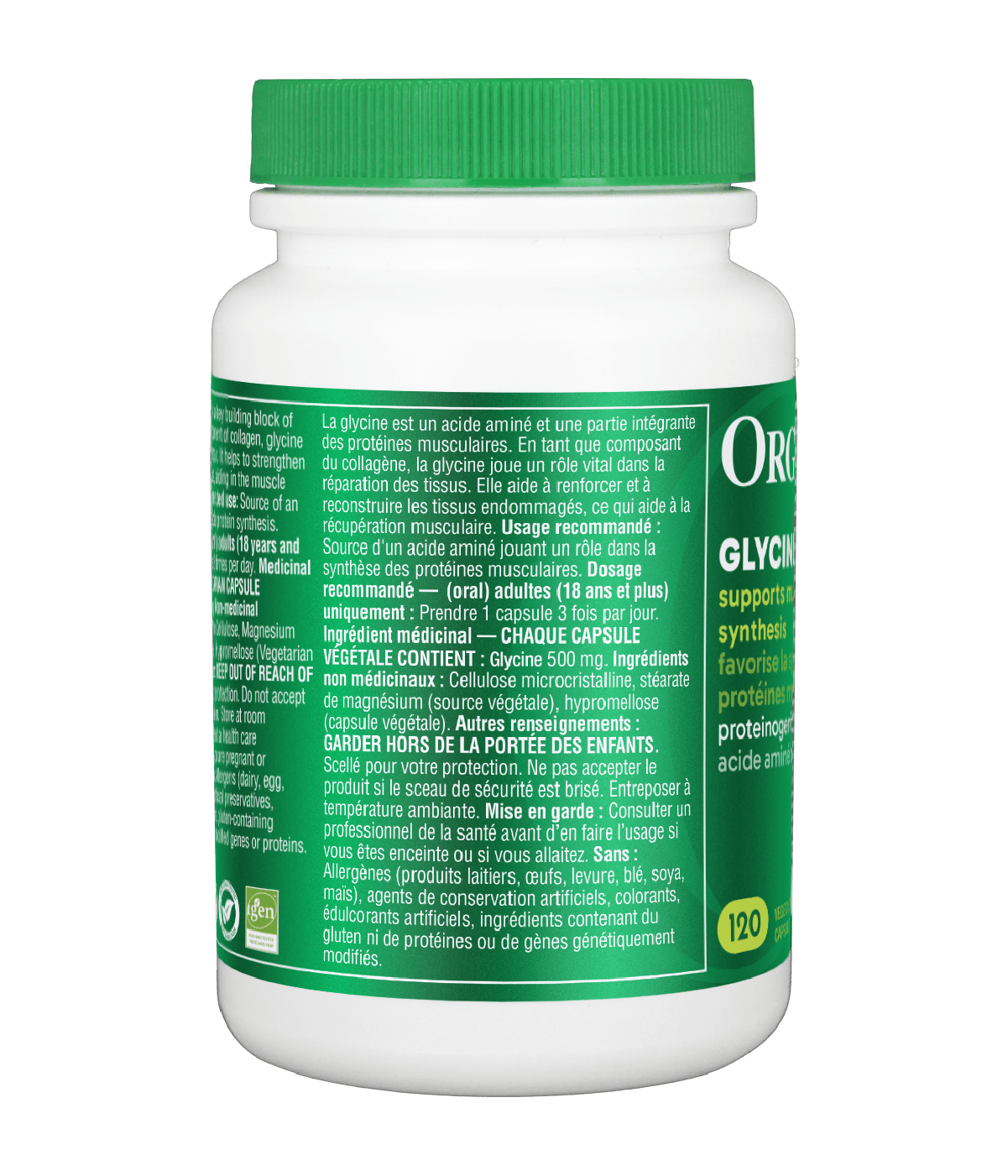
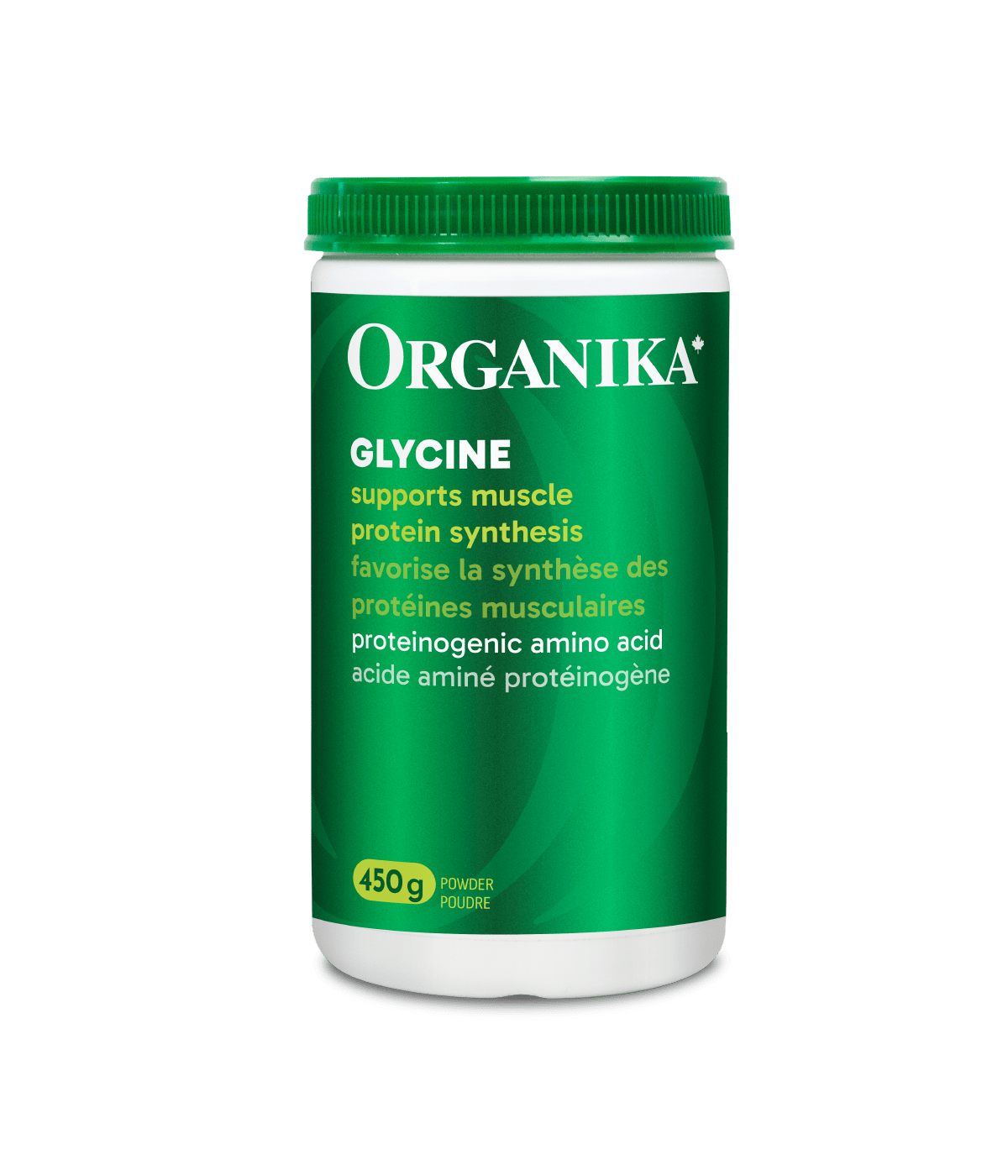
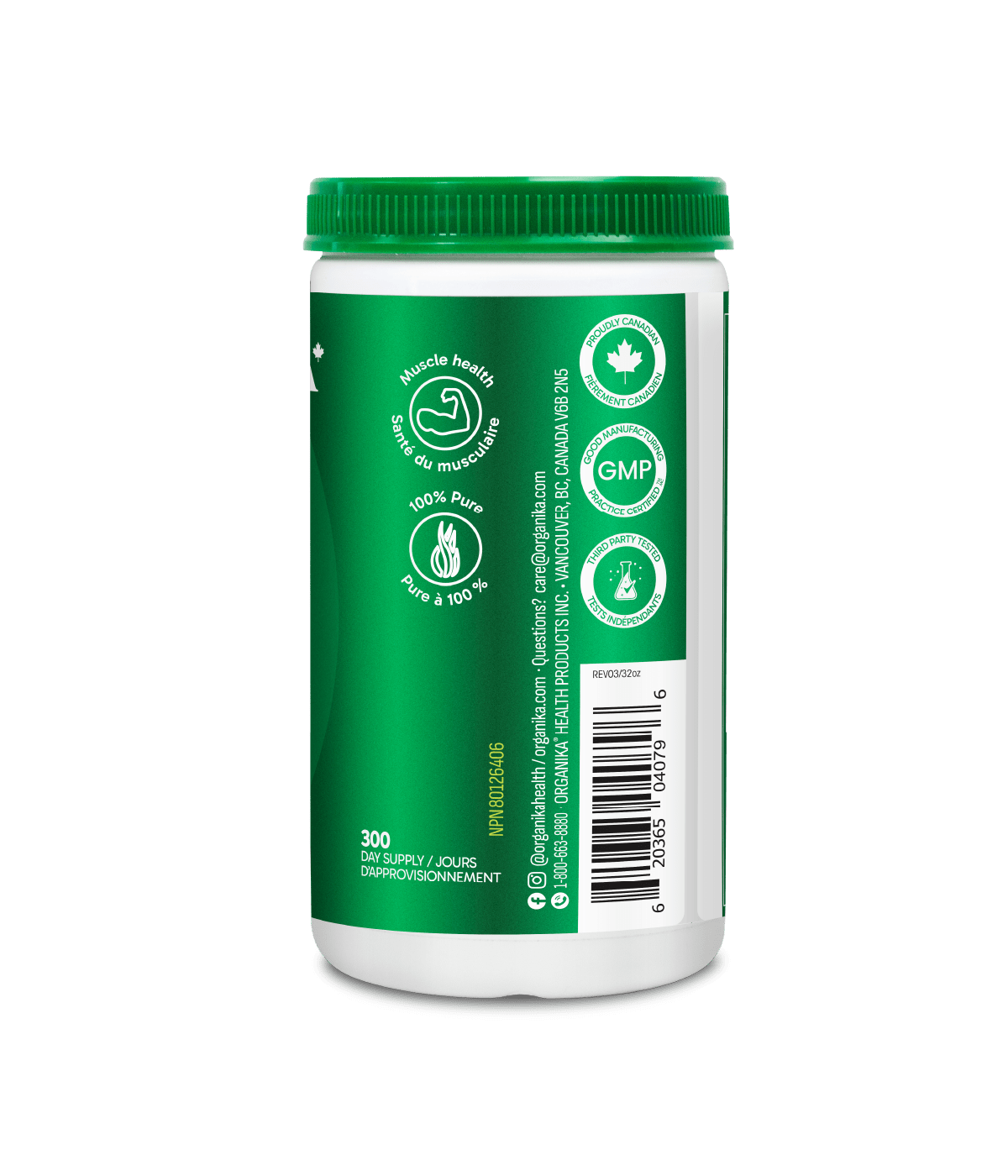
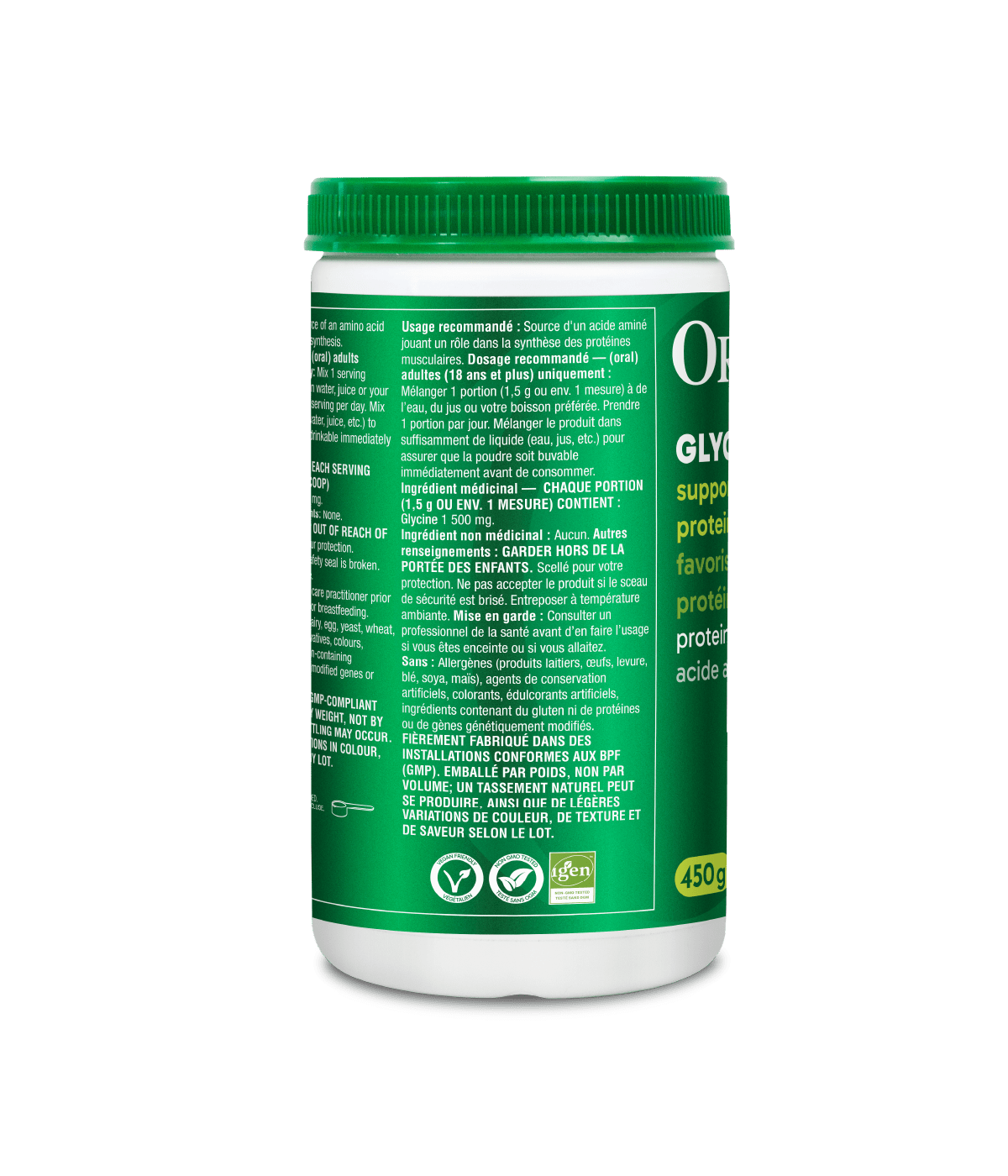
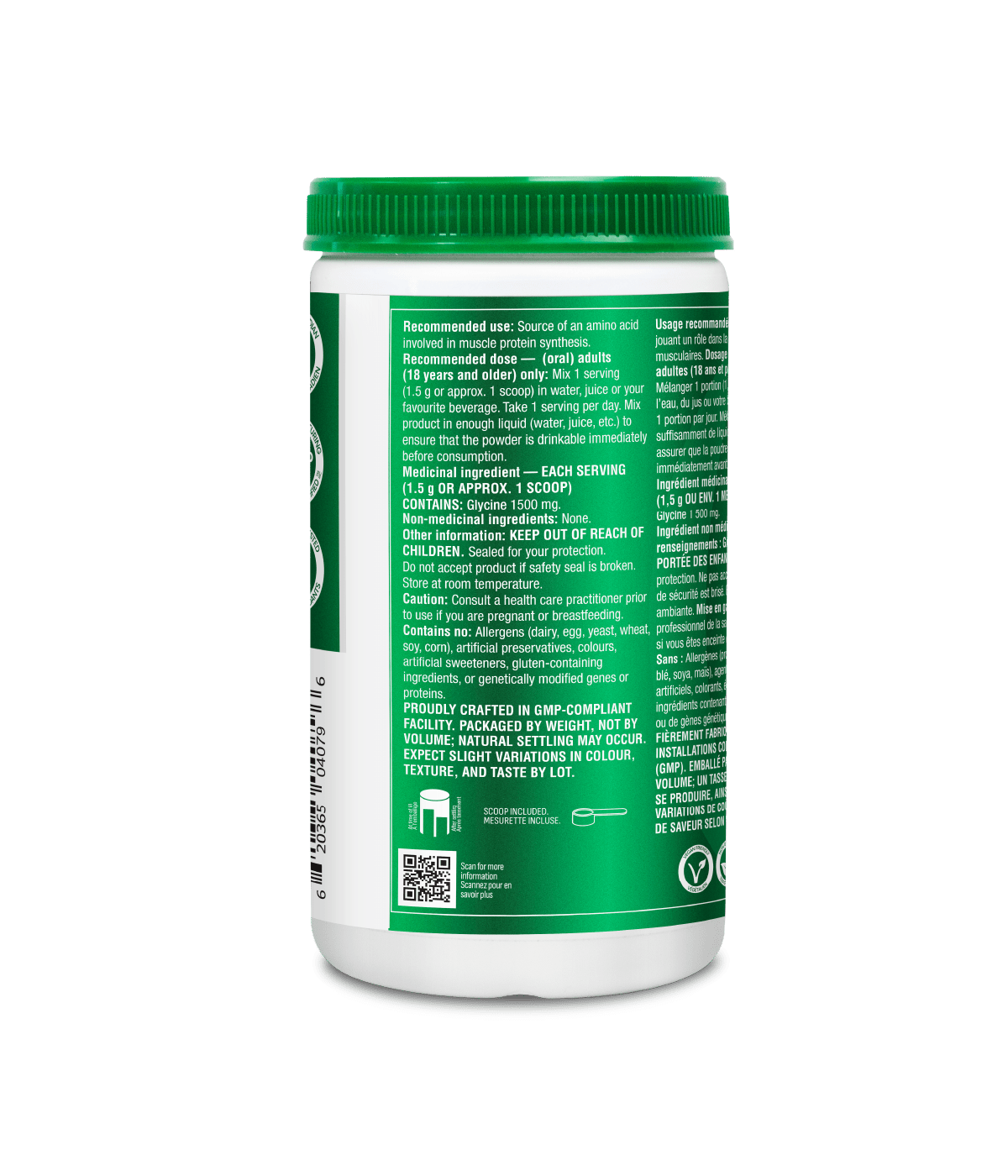




-
Is this right for you?

-


-


-

-

-

-

-

-

-

-

Glycine
Better sleep, recovery and clarity powered by glycine
- Calms the nervous system supporting restful sleep and relaxation
- Promotes cognitive function
- Supports collagen production for healthy skin, joints and connective tissue
- Supports muscle growth and repair
Couldn't load pickup availability
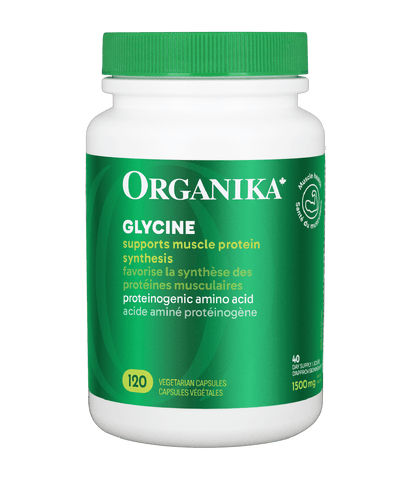
Notify Me When Available
Enter your email and we'll let you know as soon as this product is back
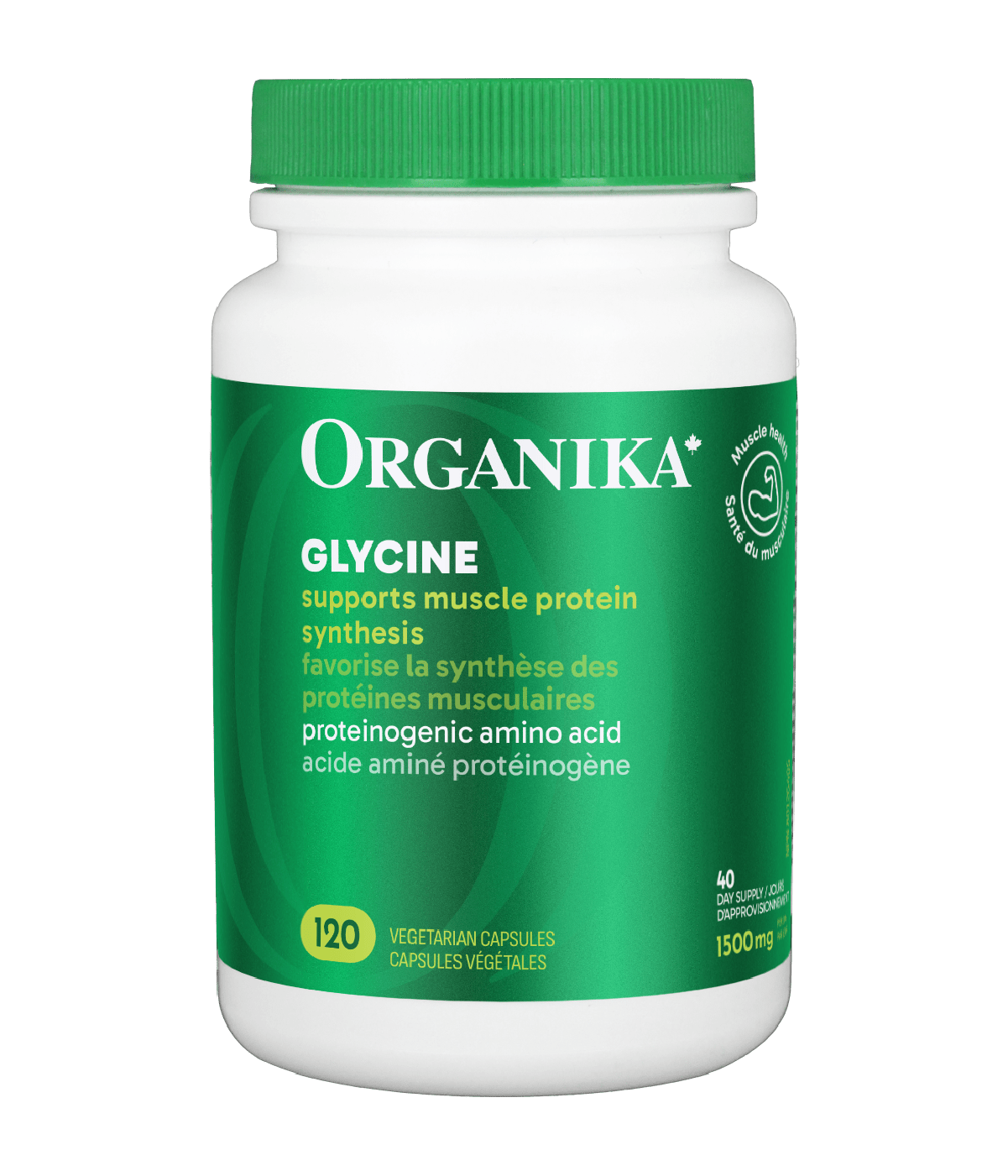
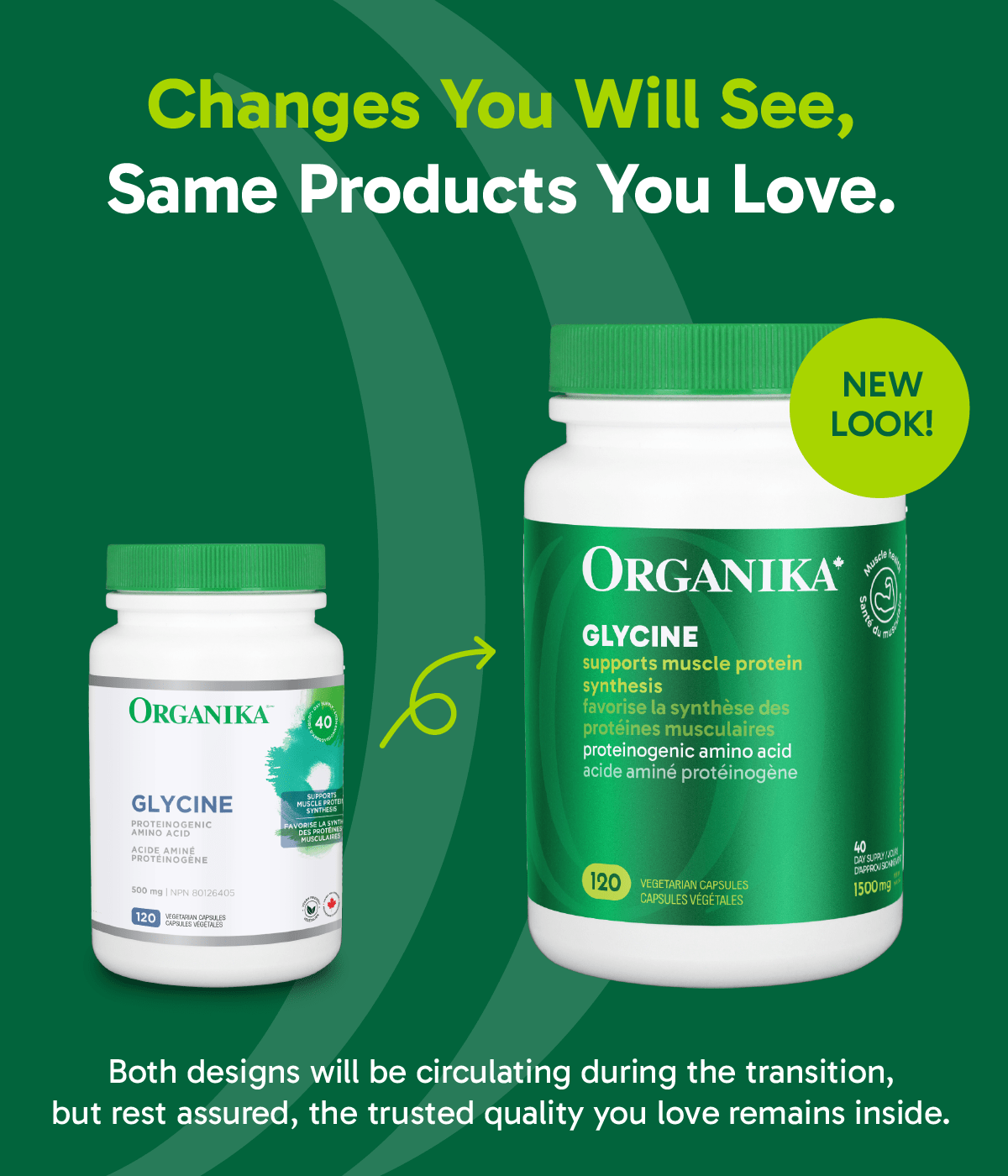
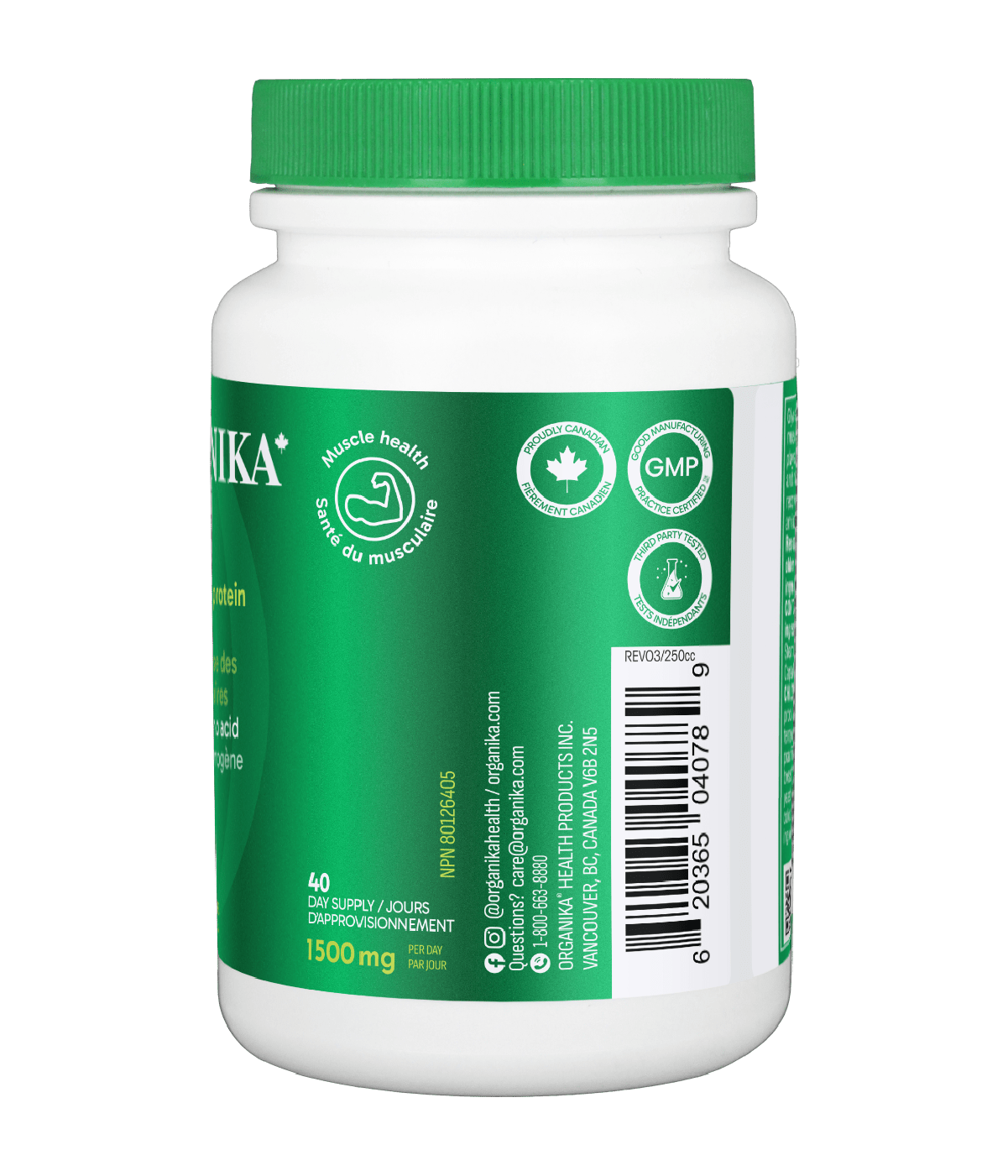
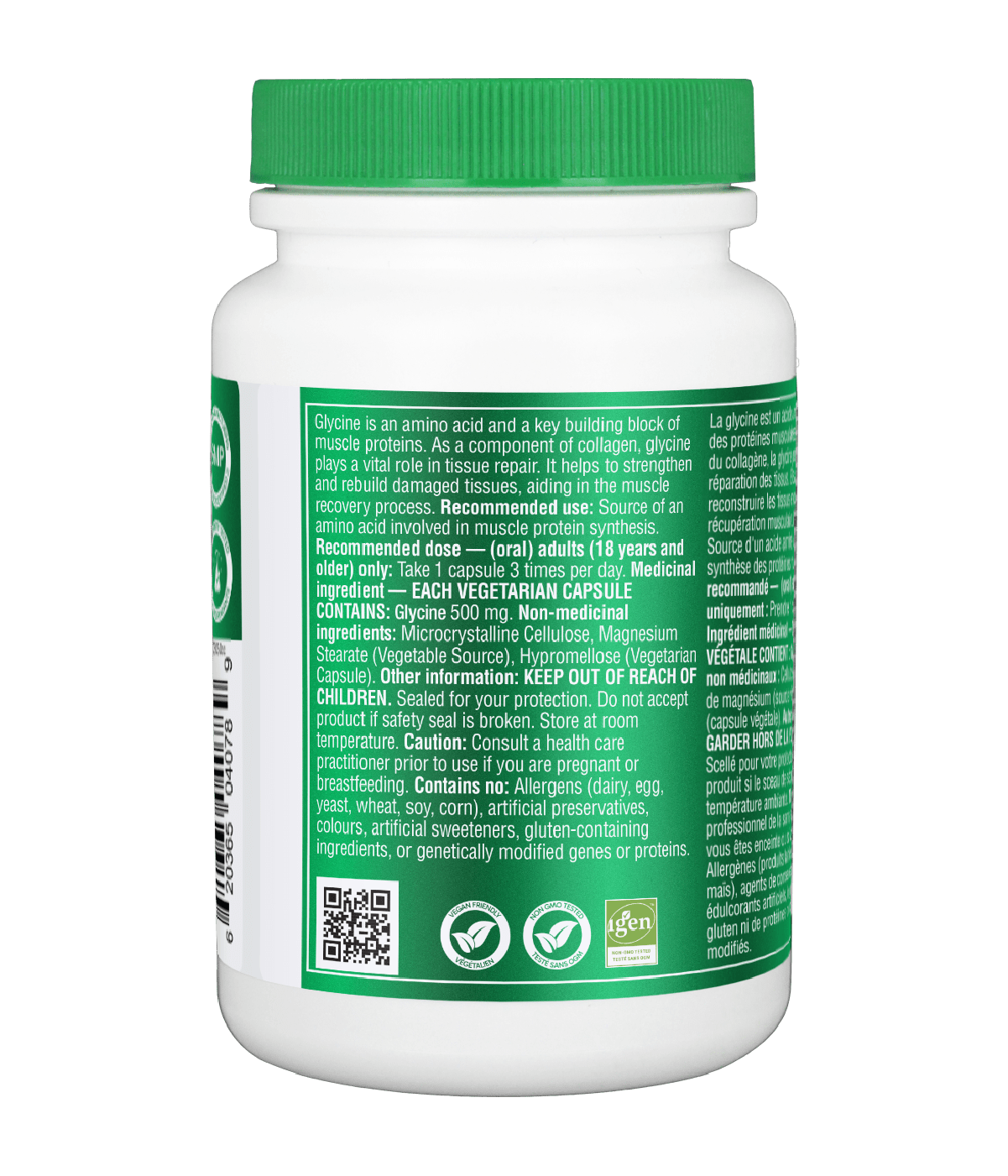
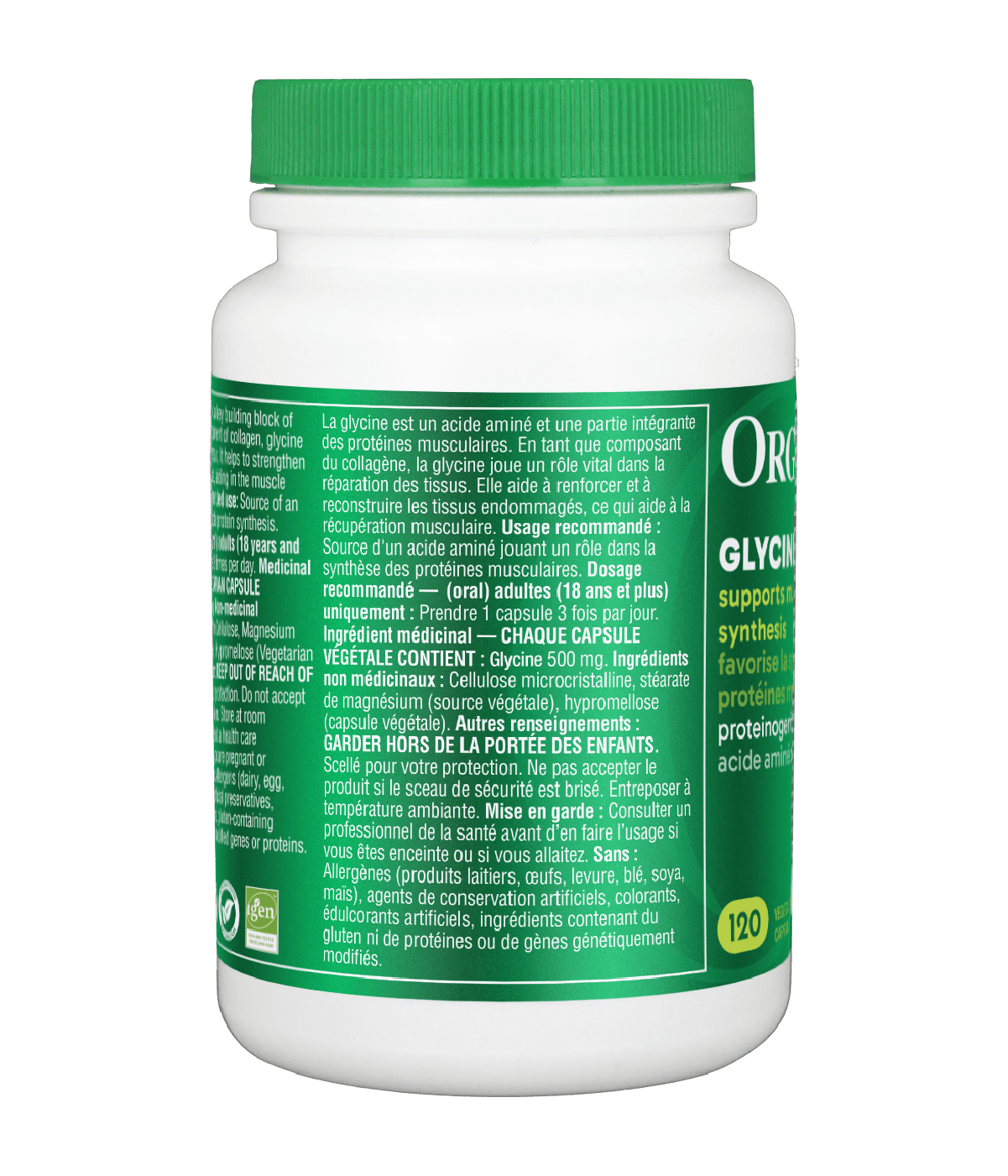
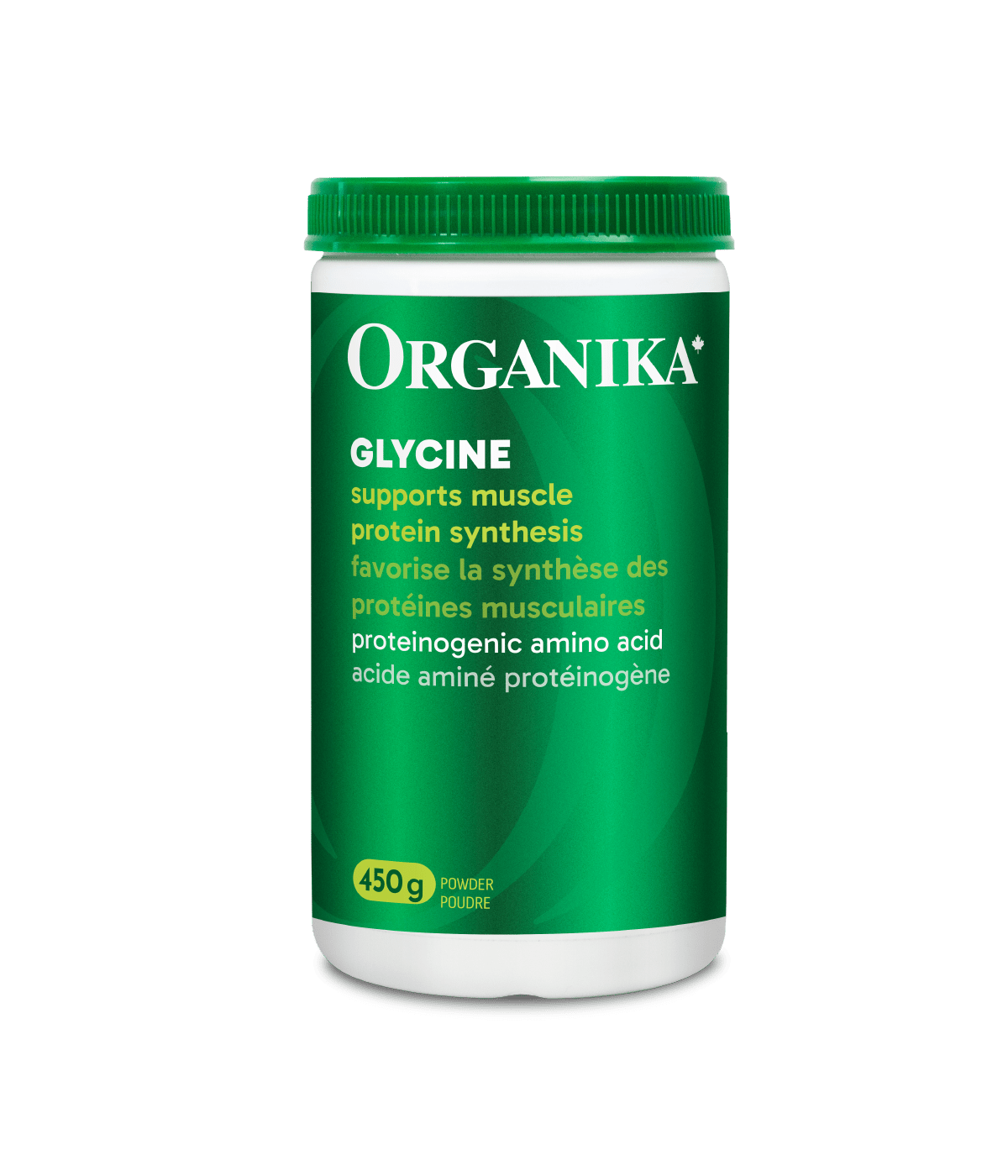
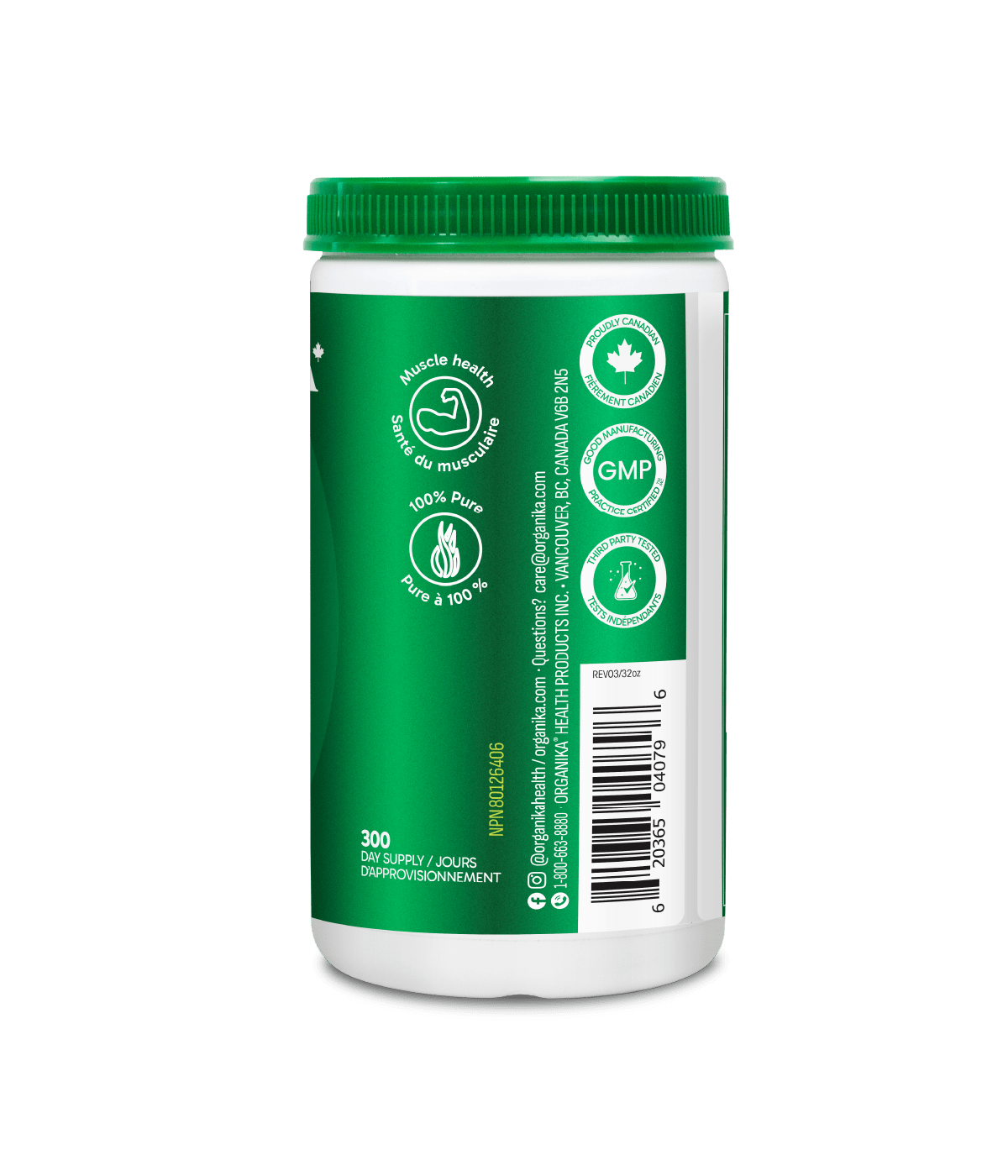
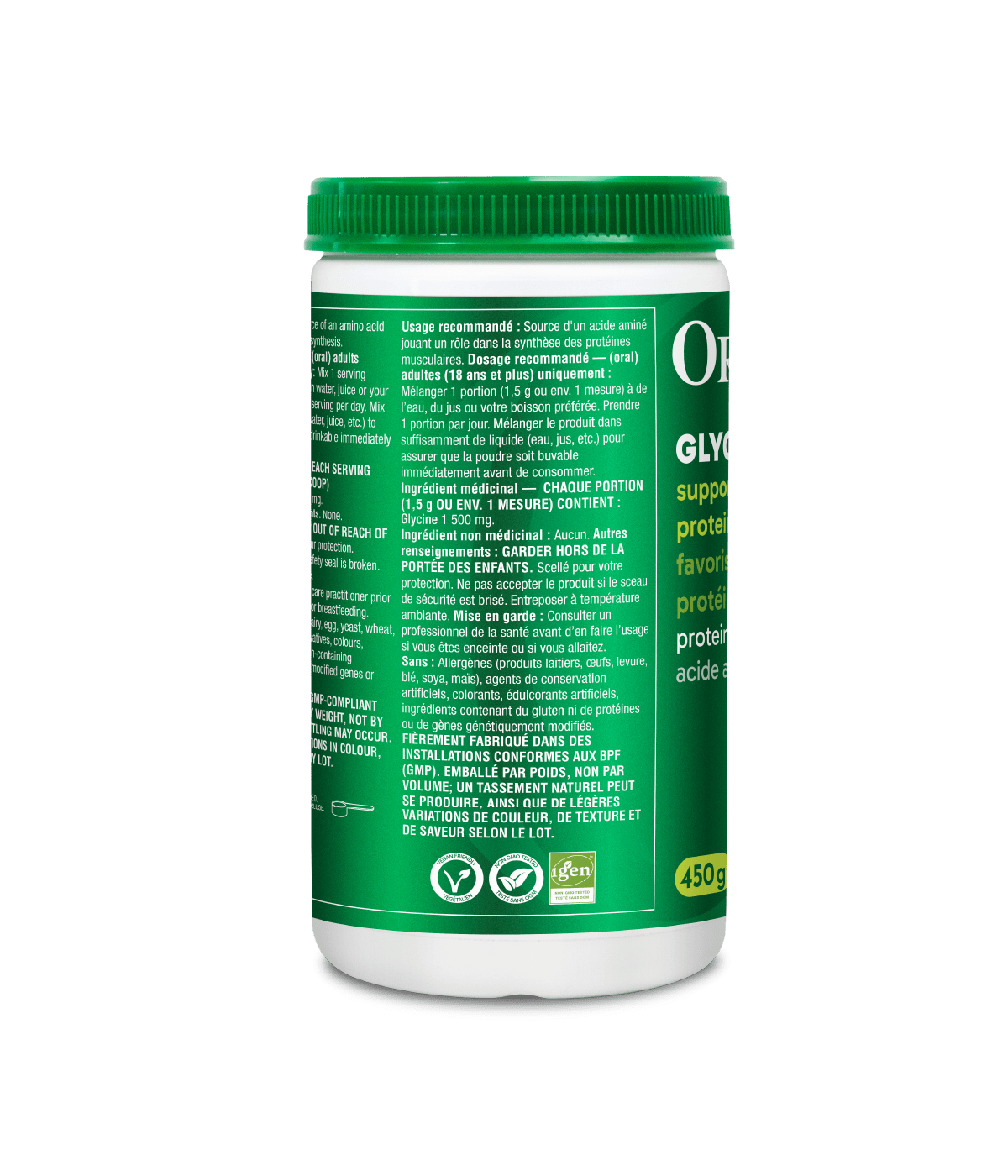
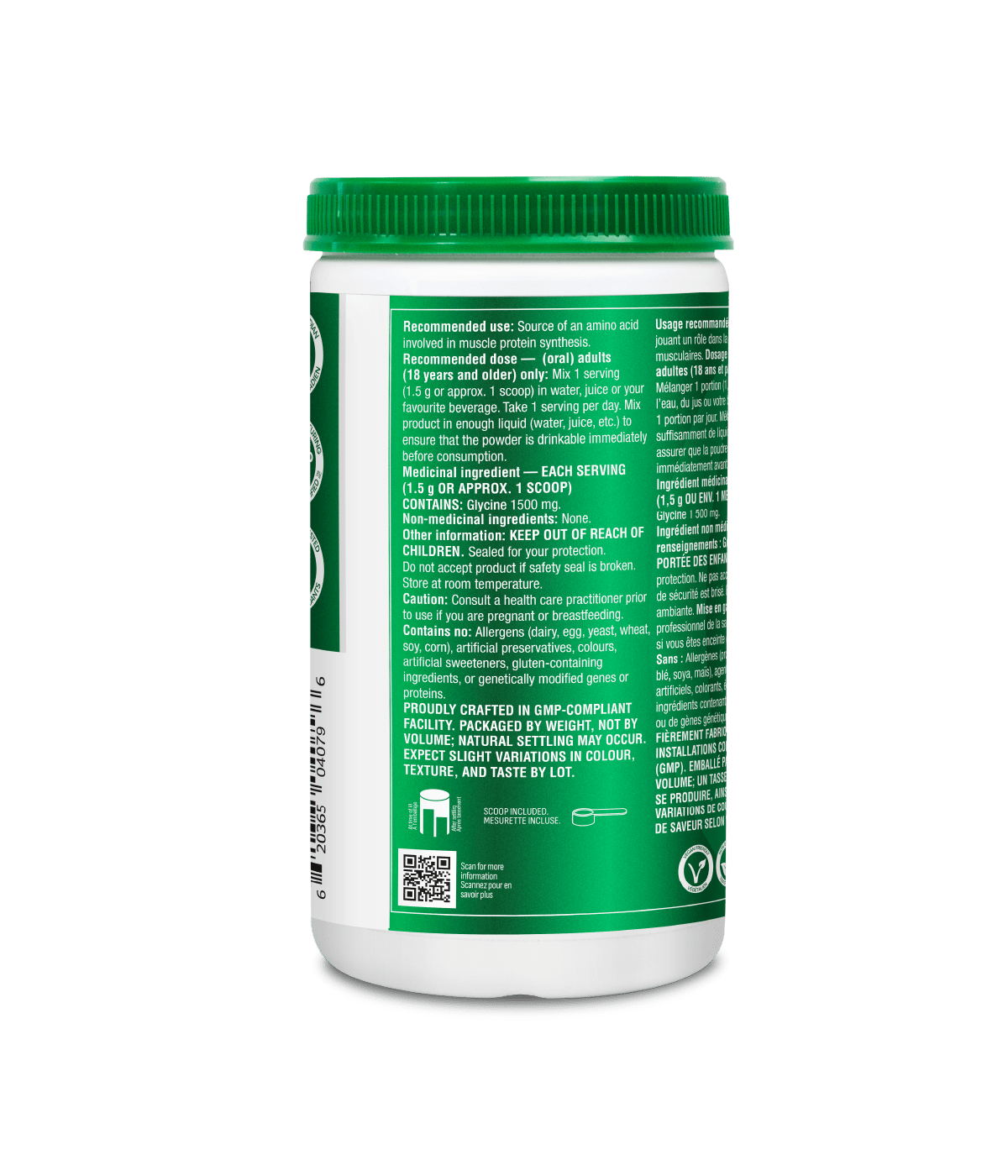









Supplement Facts
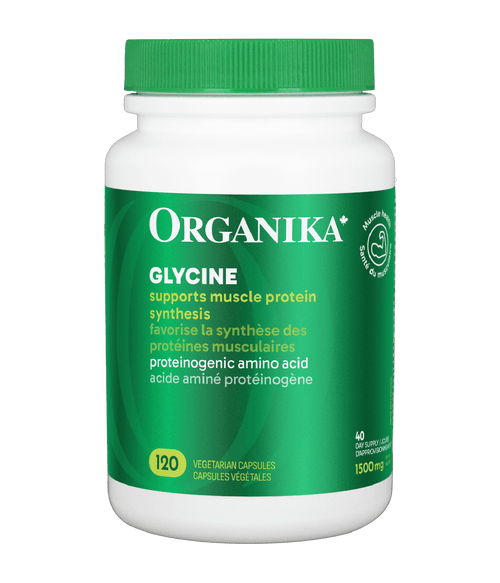
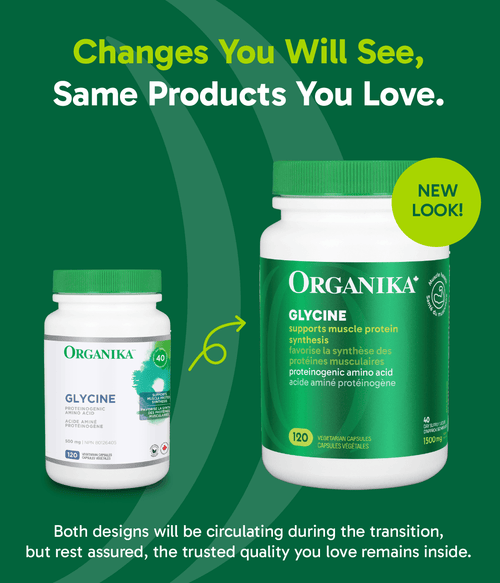
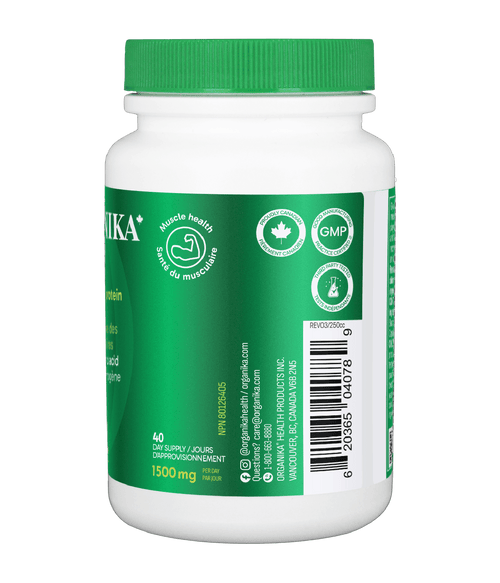
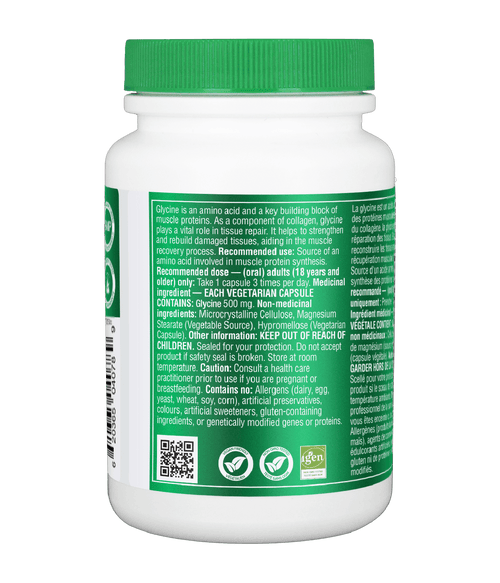
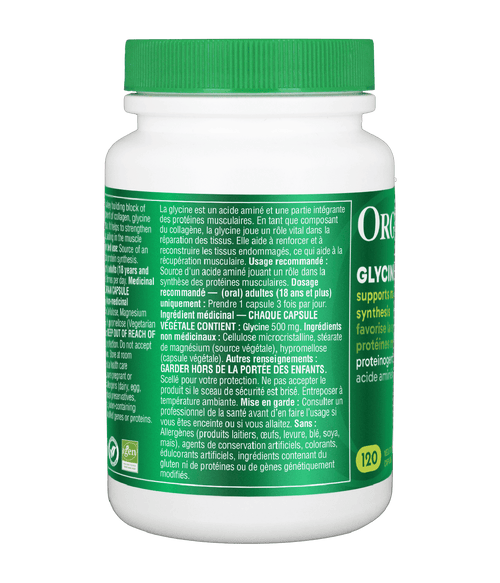
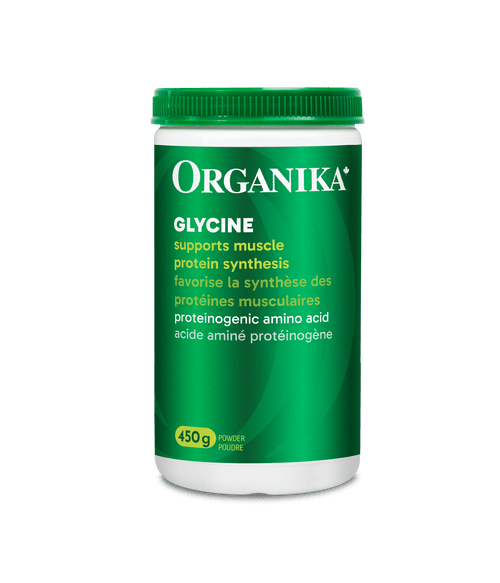
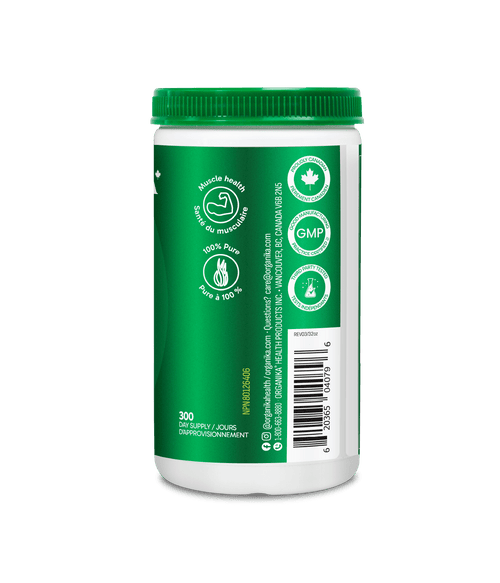
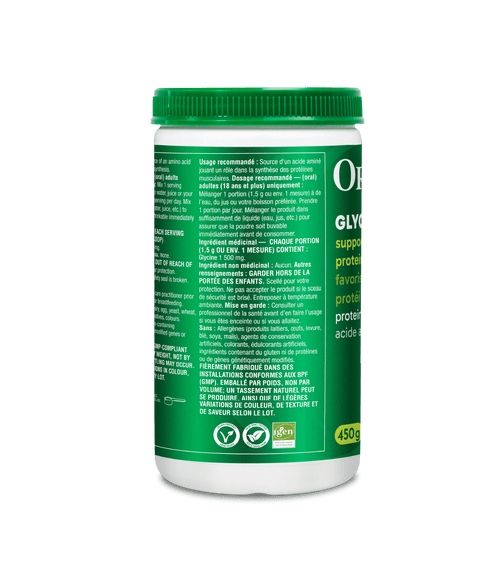
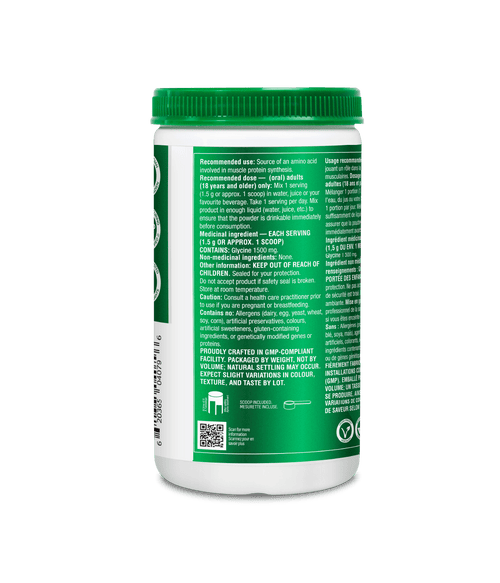
Ingredients & Nutrition
Glycine Capsutes MEDICAL INGREDIENTS: Glycine 500 mg NON-MEDICAL INGREDIENTS: Microcrystalline Cellulose, Magnesium Stearate (Non-GMO Vegetable Source), Hypromellose (Vegetarian Capsule).
Glycine Powder MEDICAL INGREDIENTS: Glycine 1500 mg
Comment utiliser
Glycine Capsules: Take 1 capsule 3 times per day.
Glycine Powder: Mix 1 serving (1.5g or approx. 1 scoop) in water, juice or your favourite beverage. Take 1 serving per day. Mix product in enough liquid (water, juice, etc.) to ensure that the powder is drinkable immediately before consumption.
Cautions: Consult a health care practitioner prior to use if you are pregnant or breastfeeding.
Is This Right for You?
Are you looking to support deeper sleep or ease nighttime restlessness?
Do you want to enhance recovery after workouts or support muscle growth?
Would you like to calm your nervous system?
If you answered "Yes" to any of the above, this product is right for you.

-
Supports collagen production for healthy skin, joints and connective tissue
-
Supports muscle growth and repair
Ingredients & Nutrition
Recommend For
Are you looking to support deeper sleep or ease nighttime restlessness?
Do you want to enhance recovery after workouts or support muscle growth?
Would you like to calm your nervous system?
If you answered "Yes" to any of the above, this product is right for you.
Sans gluten
No Preservatives
Non-OGM
Dairy-Free
No Artificial Sweeteners
No Artificial Colours or Flavours
A gentle yet powerful amino acid that supports sleep, recovery, collagen production and cognitive health


The Full Scoop

-
Supports collagen production for healthy skin, joints and connective tissue
-
Supports muscle growth and repair
Glycine may be classified as a non-essential amino acid, but its benefits are anything but optional. Naturally involved in everything from muscle repair to brain function, glycine supports your body's foundational systems. It truly does it all from helping to build protein, to forming collagen and calming the nervous system. Our Glycine delivers 1,500 mg per day for more quality rest, smoother recovery and better cognition.
Ask Away
We’ve got the FAQs covered. But if you’re still stuck, we’re only a message away.
Get in TouchAre there any differences between glycine powder and capsules in terms of absorption or effectiveness?
The main difference is that glycine capsules will take longer to absorb since the shell needs to be dissolved first. Glycine powder will be absorbed as soon as it is consumed.
Can glycine supplements be taken with other medications or supplements?
Yes, glycine can be taken with other medications or supplements.
Is glycine suitable for vegetarians?
Yes, this glycine is suitable for vegetarians.
Are there any common side effects associated with glycine supplementation?
There are no reported common side effects associated with glycine supplementation.
Can glycine supplements be taken on an empty stomach?
Yes, glycine can be taken on an empty stomach.
You'll Likely Also Love...
NAD+ Booster
Cellular vitality starts here
Inositol
Support for healthy hormone & mood balance, and ovarian function in females
8-in-1 Magnesium
Eight essential forms of magnesium, one powerful formula
Mind Calm Capsules with Magnesium Bisglycinate & L-Theanine
Decreases stress and anxiety with the tranquility of Mind Calm capsules
Support Beyond Products
Combien de fois pensons-nous à la santé de notre cerveau ? Avons-nous la possibilité de penser plus clairement et d'améliorer notre mémoire ? Que pouvons-nous faire pour aider à prévenir les maladies liées à l'âge, telles que la maladie d'Alzheimer et la démence ? Il y a tant de choses que nous pouvons faire pour garder notre cerveau en bonne santé et le fait d'être "attentif" maintenant nous aidera dans les dernières étapes de notre vie. Il existe de nombreuses possibilités pour vous aider à soutenir votre cognition globale : Faire travailler votre cerveau Oui, vous pouvez faire travailler votre cerveau ! Lorsque vous le faites, vous le mettez au défi de créer de nouvelles connexions et de renforcer les anciennes. Il y a quelques activités simples que vous pouvez faire pour exercer votre cerveau et le garder vif et sain. Lire, faire des mots croisés et des mots cachés sont de bons exercices pour votre cerveau. Vous pouvez également essayer d'utiliser votre main non dominante pour écrire ou effectuer des tâches quotidiennes, comme déplacer votre souris sur votre ordinateur. Ce sont des exercices simples mais efficaces pour votre penseur ! S'ils sont pratiqués régulièrement, ils peuvent avoir un effet profond sur la santé de votre cerveau. Supplément Lorsqu'il s'agit de la santé de notre cerveau, la crinière du lion est un excellent support cognitif. La crinière de lion est connue pour être un nootropique, c'est-à-dire une substance qui peut aider à améliorer la mémoire, à renforcer la créativité et, fondamentalement, à soutenir le fonctionnement global du cerveau. Les champignons, en particulier la crinière de lion, sont excellents pour le soutien du corps entier, mais lorsqu'il s'agit de soutenir votre cerveau, ce champignon est le roi de la cognition ! Manger correctement, faire de l'exercice et avoir un sommeil de qualité sont quelques-unes des choses les plus importantes que vous pouvez faire pour la santé de votre cerveau. Bien manger Trop de sucre dans l'alimentation peut avoir des effets néfastes et durables sur le cerveau au fil du temps. Nous assistons actuellement à une augmentation de ce que les experts appellent le diabète de type 3. Il s'agit d'une maladie comme le diabète de type 2, mais le cerveau est l'organe qui résiste à l'insuline. On pense que le diabète de type 3 peut entraîner des maladies comme la maladie d'Alzheimer. Pour faire court, trop de sucre peut provoquer un manque de clarté, de la fatigue et une progression précoce des maladies cérébrales liées à l'âge. Compléter une alimentation saine par de l'exercice physique L'exercice physique apporte un flux sanguin frais au cerveau et, avec lui, des vitamines et des minéraux. L'exercice aide également à contrôler la pression sanguine, ce qui est essentiel pour prévenir les accidents vasculaires cérébraux. Sommeil Une bonne qualité de sommeil est probablement la voie la plus importante pour protéger votre cerveau et le garder en bonne santé. Votre corps se répare pendant le sommeil, en particulier votre cerveau ! Il existe de nombreuses preuves de l'importance d'une bonne nuit de sommeil et des effets qu'elle a sur le cerveau. Il est peut-être utile de réfléchir à des nuits supplémentaires et d'améliorer la qualité de votre sommeil. Lorsque vous réfléchissez à vos objectifs de santé généraux, n'oubliez pas d'inclure votre cerveau dans votre régime de santé. Consultez toujours votre médecin naturopathe ou votre prestataire de soins de santé avant d'apporter des changements majeurs à votre régime quotidien, comme un exercice physique intense ou une supplémentation.
read moreWhat is Collagen? Collagen is the most abundant form of protein in our body. It provides strength, elasticity, and tone. Although we may think of collagen only in our skin, it can also be found throughout our bodies: from muscle fibres and bone matrix to our blood vessels. Collagen is the protein responsible for strong and flexible connective tissues. The collagen in our skin plays the role of improving our skin's moisture, suppleness and elasticity, and a healthy amount of collagen will give an overall youthful appearance. Our body produces its own collagen, using 3 amino acids as key "building blocks"; they are Glycine, Proline, and Hydroxyproline. Collagen formation in our body involves complex enzymatic reactions, and providing the building blocks is crucial in the process. WHY SHOULD I SUPPLEMENT WITH COLLAGEN? As we age, our collagen formation naturally decreases: starting at 1% every year in our twenties, and up to 50% by the time we hit 45. Poor lifestyle choices, such as smoking, can further decrease the collagen formation rate in our body. Less collagen leads to a loss of elasticity, strength, and tone throughout the body. You may notice this through signs of ageing, such as: Fine lines/wrinkles Brittle nails Cellulite Sagging skin Loss of moisture Weak ligaments Aching joints Arthritis Cartilage injuries There are ways to bring the collagen formation rate up again, such as providing enough "key building blocks." These amino acids are abundant in collagen-rich food, such as bone broth and chicken feet. Unfortunately, most people don't get enough collagen in their diet. Hence, collagen supplementation is beneficial for most people! It helps reduce the signs of ageing, keep the strength, tone and health of our connective tissues, and even improve the digestive tract. There are so many benefits to collagen other than beautiful skin, hair, and nails! THE MAIN TYPES OF COLLAGEN Let's break down the three most common types of collagen that you'll see in our bodies: Types 1, 2, and 3. Supplemental collagen is mainly found as Type 1, as well as a combination of Types 1 and 3. Generally, sourcing plays a role in the type of collagen that is extracted. For example, bovine collagen is sourced from the hides of cattle and is naturally high in Type 1 collagen. Here is a chart of the most common types of collagen supplements and how they are sourced. Now that you are ready to start supplementing with a Collagen powder, which source should you use? What is the difference? Is there a price difference between them? Here is a breakdown of the characteristics and benefits of bovine, marine, and poultry-sourced collagen: Bovine Collagen Naturally sourced from the hides of cattle (be sure it is sourced from the hides), this kind is very high in collagen Types 1 and 3 and contains a high amount of protein. In fact, it contains almost double the amount found in marine collagen. With a large amount of glycine (a functional amino acid), bovine collagen is excellent for hair, skin, nails, as well as our connective tissues and digestive health. In most cases, bovine collagen will give you a better bang for your buck. Marine Collagen Naturally sourced from the scales and/or skins of marine species (usually cold water fish like cod or salmon), marine collagen is very high in Type 1 collagen, which is known to increase tightness, tone, and skin elasticity. It is very beneficial for skin, hair, and nail health, and is referred to as the fountain of youth. If you are a pescetarian or prefer fish-based products, marine collagen is the one for you. Poultry Naturally sourced from chicken sternum cartilages (very high in Type 2 collagen), it is high in Hyaluronic Acid and Chondroitin Sulfate, which are essential for healthy and strong cartilages, joints and ligaments. BioCell Collagen contains a potent amount of hydrolyzed collagen which stimulates collagen production in the skin, supports the health of our joints, and keeps the moisture in our skin and lubrication around our joints. What Can Collagen Do for Me? Collagen is highly beneficial to our body for many health reasons. Mostly known for its anti-ageing effects, collagen has been researched and shown to improve more than just your skin's texture and tone. So, what are the benefits of collagen supplements? Here are a few proven benefits from collagen: Increased moisture within the body (skin & joints) Improved digestive health (leaky gut) Immune support Improved mood Stable blood sugar/weight management Connective tissue health (joints, cartilage and ligaments) Reduction in inflammation within the body Improved bone health The amazing thing about collagen is that it is a very versatile and functional supplement for all lifestyles and ages. It is also an easy supplement to include in your daily routine: add it in your morning smoothies, yogurt, coffee, and even to your baking! Organika's Enhanced Collagen Enhanced Collagen from Organika goes above and beyond to meet the needs of the modern-day health enthusiast. Stress, energy, cognitive function, etc. are all symptoms that can be addressed through Organika's collagen - hence the name "Enhanced"! Whether you are in a time crunch or need a convenient way to get some much-needed nutrients, Enhanced Collagen can help you make an event out of your morning cup, or give your baked goods a nutritious boost. It is super simple to find a product that works for you! Organika has a variety of formulas created just for your modern, on-the-go lifestyle and all can be mixed in water, smoothies, coffees, even baked goods! So find which one works best for you! Check out this handy cheat sheet. Conclusion: With over 300 various collagen supplements on the market, choosing the collagen that is right for you can seem overwhelming and confusing. When choosing a collagen supplement, always make sure to ask or research a few important details before making your decision. Wondering what makes a great collagen supplement? Find out here in this blog. Do you still have questions about Collagen? Download our e-book to learn more about the different types of collagen and which one is for you!
read moreThere’s different types of collagen? Collagen has become the talk of the health industry, fitness industry as well as the beauty industry. Why? It’s an important protein. In fact, it is the most abundant protein in your body, making up 30% of your protein mass.[1] Collagen is found in our bones, connective tissues (joints, ligaments, and cartilages), muscles, hair, skin, nails and even our blood vessels. Though important for many reasons, collagen’s primary function is strength and structure. Think of it as the glue that holds your body together. Collagen peptides are what give your skin elasticity, shape, and structure in joints. Now you may understand why there are various types of collagen (16 to be exact). Regarding supplements, the most talked about types of collagen are type 1, 2, and 3. Collagen supplements come in various forms of either hydrolyzed collagen (collagen peptides, collagen powder, collagen capsules or liquid form), gelatin or undenatured collagen. Hydrolyzed collagen peptides seem to be the easiest for the body to absorb and use. Type 1 Collagen Where is it found? Type 1 collagen is found in our hair, skin and nails and is the most abundant type of collagen in our body, making up around 90%. Type 1 collagen also can be found in our bones – making up around 40% of our bone matrix as well as in our ligaments. Sources of Type 1 collagen include marine and bovine collagen. What does it do? Type 1 collagen is essential when it comes to the beauty benefits of Collagen as it is what is responsible for our skin elasticity, strength and helps with anti-aging. Cellulite is a loss of elasticity in our skin and type 1 collagen plays a significant role in that. Products with Type 1 Collagen Peptides All our Enhanced Collagen products contain Type 1 and 3 collagen, sourced from grass-fed bovine with no hormones or antibiotics Marine Collagen Powder made from fish scales containing only Type 1 collagen Liquid Marine Collagen with Biotin and Vitamin C is marine collagen in liquid form with beauty-boosting ingredients Salmon Collagen Capsules derived from the skin of wild salmon, rich in Type 1 collagen only Effervess tablets made with marine collagen and vitamin C Beef Bone Broth rich in Types 1 & 3 collagen Type 2 Collagen Where is it found? Type 2 Collagen is what we find in our connective tissues – think joints, ligaments, and cartilage. Chicken is known to have a very high amount of type 2 collagen in it. What does it do? Type 2 collagen is what is responsible for maintaining the structure of our bones and cartilage. When we have a loss of collagen in our body (it naturally decreases as we age and is affected by smoking or UV light exposure), cartilage and ligaments start to weaken and break down, leading to damage and osteoarthritis. Products with Type 2 Collagen Peptides Biocell Collagen derived from chicken cartilage (sternum) rich in type 2 collagen, with added hyaluronic acid and chondroitin sulfate for optimal joint health Chicken Bone Broth has type 2 collagen as well as essential glycosaminoglycans (GAG’s) to help with connective tissue Type 3 Collagen Where is it found? Type 3 collagen is also an abundant form of protein found in our body and found alongside type 1 collagen fibers. It is in the reticular fibers in the body. Those reticular fibers are your bones, muscles, organs, blood vessels, dentin, tendons as well as some other connective tissues. What does it do? Type 3 collagen alongside type 1 collagen is essential for improving the elasticity in our skin, anti-aging, improved circulation, healthy bone matrix, healthy nails and thicker hair. Products with Type 3 Collagen Peptides Enhanced Collagen is the #1 selling Collagen Powder in Canada* and made with grass-fed bovine, antibiotic and hormone free, offering both type 1 and 3 hydrolyzed collagen peptides. Try any of our products with Enhanced Collagen Beef Bone Broth: Excellent source of type 3 collagen! Rich in essential minerals and GAG’s known to contain Hyaluronic acid, chondroitin, and glucosamine What Types of Collagen Do You Need? Now that you know the various types of collagens, you may be wondering which one to use. 1. Let’s start with sourcing the best types to consume. Collagen (all types) is a large molecule, so start by choosing supplements that have gone through hydrolyzation. Look for hydrolyzed collagen peptides for optimal absorption. 2. Next, choose your collagen supplement based on what your health needs are, what benefits you would like to see and how each type of collagen can help your body overall. a) Are you focused on beauty and bone and joint health – you may want types 1 and 3 b) If you are only focused on joints and ligaments – you may want bone broths that are rich in Type 2 3. Third, choose the one that suits your lifestyle best. Do you prefer powder (to mix into your choice of beverages or water), capsules, or liquid? If you feel you want to supplement with all three types of collagen, that is acceptable. With collagen consumption you are also getting an intake of 17 other types of amino acids that are beneficial as well. “If you are looking for an overall collagen 1-5, combine Full Spectrum and the Vegetarian Collagen capsules. Enhanced Collagen is great because it has type 1 and 3. Type 1 for hair, skin, nails bones etc. Type 3 is great to support the gut health. I would suggest type 2 collagen for those who are looking to specifically support joints/inflammation.” Stephanie Lannon, R.H.N. and Wellness Educator Supplementing with Full Spectrum Collagen This is a plentiful form of Types 1, 2, 3 collagen and can keep muscles and tendons together and even rebuild your cartilage, helping to fight the symptoms of arthritis. “With age, collagen formation declines naturally, leading to a loss of elasticity, strength, and tone throughout the body. Organika’s Full Spectrum Collagen provides you with Bovine Collagen types 1 & 3 (giving you thick hair, strong nails, supple skin, healthy joints, as well as supporting a healthy digestive tract), Marine Collagen Type 1 (supports fuller hair, stronger nails, and youthful skin), and Chicken Bone Broth Type 2 Collagen (naturally high in hyaluronic acid and glycosaminoglycans that help build strong joints and connective tissues).” - Joleen Gruber, R.H.N. and National Educator. Want to choose collagen but are vegetarian or vegan? If you are vegan, we have a Plant-Based Collagen Booster for those wanting to simply increase their own collagen production. For vegetarians we also carry Vegetarian Collagen made from natural eggshell membranes (contains type 1 collagen and others). What Do the Experts Say About Collagen Types? Resident experts Joleen Gruber, R.H.N. & National Educator, and Stephanie Lannon, R.H.N. & Wellness Educator, weigh in on commonly asked questions about collagen, types of collagen and consuming collagen peptides. Should one be aiming for all types through their diet? Is Type 1 and 3 enough? It really depends on the desired benefits/needs. Enhanced collagen type 1 and 3 (Enhanced Collagen) is suitable for most (except for pescatarian/vegetarian/vegan or opposed to taking bovine). Once you know what you would like to get out of collagen then you can select your product. While it’s not necessary to aim for all of them, it is fine to consume all as they serve different areas of the body. What advice do you have for people that are solely marine or Type 1 collagen? Change it up and add different types of collagen to fill in the gaps (joint health, hair, skin, nails, cartilage) because as we age collagen is declining from all areas of the body. If, however, you do only want to focus on the beauty benefits and have little to no joint concerns, it is perfectly fine to go for solely Marine or Type 1 collagen (for which we have options as well). What are the products you typically recommend for someone looking for each type of collagen? The beauty of collagen is the fact it is customizable to each person’s lifestyle. Enhanced Collagen is great place to start and is Canada’s #1 collagen powder as it has type 1 and 3 and is a great collagen for those who are looking for skin, hair, nails, joints, gut support, muscles etc. There are also blends that offer added benefits; for example, better sleep (Enhanced Collagen Sleep), energy (Enhanced Collagen Vitality) etc. For pescatarians, then Marine Collagen may be best. For older adults, or if you truly want a range of collagen, they can either go with a Full Spectrum Collagen or Vegetarian Collagen capsules. Full Spectrum Collagen has type 1, 2 and 3. Vegetarian Collagen (eggshell membrane) that includes type 1,4 and 5 collagen. Both can be combined with our Full spectrum Collagen to get all 5 collagens. For busy bees, you may want to try Liquid Enhanced Collagen as taking a shot a day may be easier than finding an opportunity to make a drink or meal using the powder form. Is there a maximum amount of collagen per day that is recommended/suggested? There is no upper limit for collagen. However, usually between 2.5 g to 15 g per serving is sufficient to reap the benefits. Our body absorbs everything better if it is spread throughout the day There is not a maximum level per se, if you consume too much, your body will just burn the excess as fuel, or you may experience gastrointestinal disturbances. Note: Remember collagen is a protein (though not a full protein) and will contribute to the amount of protein getting elsewhere. Therefore, the amount you can consume may vary. If you are an athlete, then the amount of protein/collagen you can consume may be up to 25 g per day. It’s best to speak to a nutritionist to ensure you are getting a collective amount of protein that is within the suggested amount your body needs. Have more questions? Talk to our experts about product recommendations.
read more






